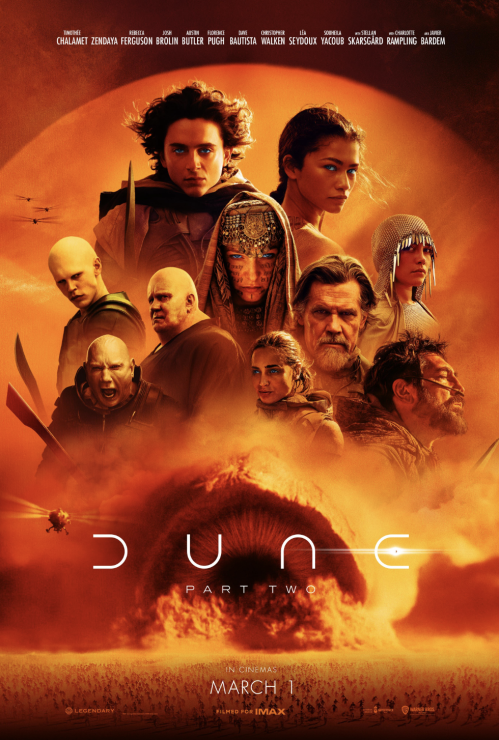And why Denis Villeneuve’s sequel is going to break Hollywood

Photo via IMDb.com.
Whether you’ve read Frank Herbert’s sci-fi masterpiece or are simply a fan of Timothée Chalamet and Zendaya, there’s a good chance you’ve heard of Dune. The novel follows the story of a young boy named Paul who is whisked off by his father to the dangerous planet of Arrakis, where water is worth more than gold. His father, Duke Leto Atredes, has been placed in charge of extracting the most valuable resource in the universe, a spice called melange that can extend lifespans and power interstellar travel. But once Paul and his family arrive, things quickly turn sour and it becomes clear that the family’s relocation to the desert planet has been sabotaged by their family enemies and previous rulers of Arrakis, the evil house Harkonnen. At the story’s heart, it’s a tale about the evils of colonizers, ethnic cleansing, and political manipulation of Indigenous groups that in the end, leads to nothing but death and suffering.
At its core, the book is a layered and complex political drama about colonialism and religion. Originally published in 1965, Dune and its following sequels have aged remarkably well compared to its contemporaries due to its anti-colonial and anti-religious-fundamentalist messaging. More than anything, Dune is about the human struggle against death and the endless battle to control our own fate.
Reviews for Dune: Part Two, which was directed by Canadian Denis Villeneuve, have heralded it as a masterpiece. With its opening weekend grossing $182 million, some have compared it to Lawrence of Arabia, Empire Strike Back, and the Dark Knight, with numerous critics calling it the greatest sci-fi/fantasy series since The Lord of the Rings. This praise is not surprising; Herbert’s franchise has long been a favourite among speculative fiction fans as well as academics. But almost 60 years later, its themes are more relevant than ever.
Even since the release of the first film installment in 2021, AI programs like ChatGPT and video generation software like OpenAI have developed exponentially and have made their way into the hands of the general public. Like many other sci-fi authors of his time, Frank Herbert predicted this. However, he took an alternative approach to representing computers and artificial intelligence. The world of Dune exists in an age post-AI, where humanity has been ravaged and destroyed by their own creations and, as a result, so-called ‘thinking machines’ have been outlawed. In the wake of this destruction, Herbert’s sci-fi universe is one without robots, AI, or aliens, and instead focuses on the human struggle against fate and the dangers that come with gaining political influence.
Even at the time of its publication, Dune was heralded by its fanbase as a remarkably progressive and anti-colonialist novel for its era. It takes heavy influence from Islamic and Buddhist faith, Eastern spiritualism, and Indigenous ways of living, melding them together to create a self-awareness that was absent in speculative fiction of its era. While Dune is by no means a perfect novel and is absolutely guilty of appropriating a plethora of non-western cultures (either consciously or unconsciously), it stood out as progressive in comparison to its contemporaries at the time of its original publication.
Unlike the whitewashed film adaptation by David Lynch, Villeneuve’s remake emphasizes the indigeneity of the native peoples of Arrakis as the book did, casting people of colour to play the roles of the Arrakeen people of the Fremen. While admittedly, this is a small step forward for Villeneuve’s interpretation, it highlights the failures of the previous adaptations and provides a promise to fulfill the goals of the original book. While the novel’s protagonist is a white colonizer and was written by a white settler, Dune is self-aware of its bias and paints the colonizers in the story as a destructive force, even turning our so-called ‘hero’ into a force of destruction by the novel’s end.
In a modern-day political climate where colonialism, genocide, religious fanaticism, and unethical resource extraction are at the forefront of public discourse like never before, I believe the themes central to Herbert’s original novel to be more relevant than ever. I believe we will look back in 10 years and see the release of this film as a giant cultural moment, not only for sci-fi, but for film and storytelling as a whole. Endlessly accessible and relevant, Dune is one of, if not the most influential work of science fiction in the 21st century.







